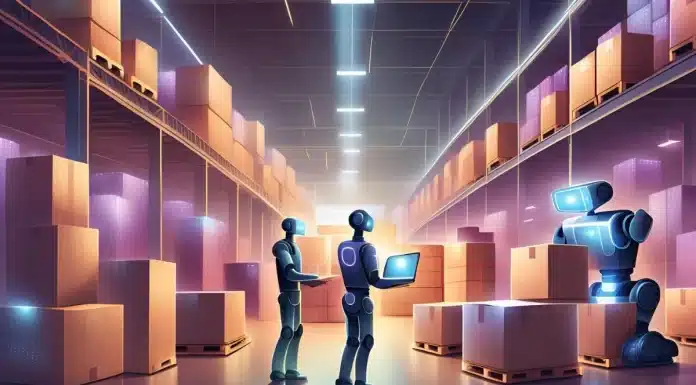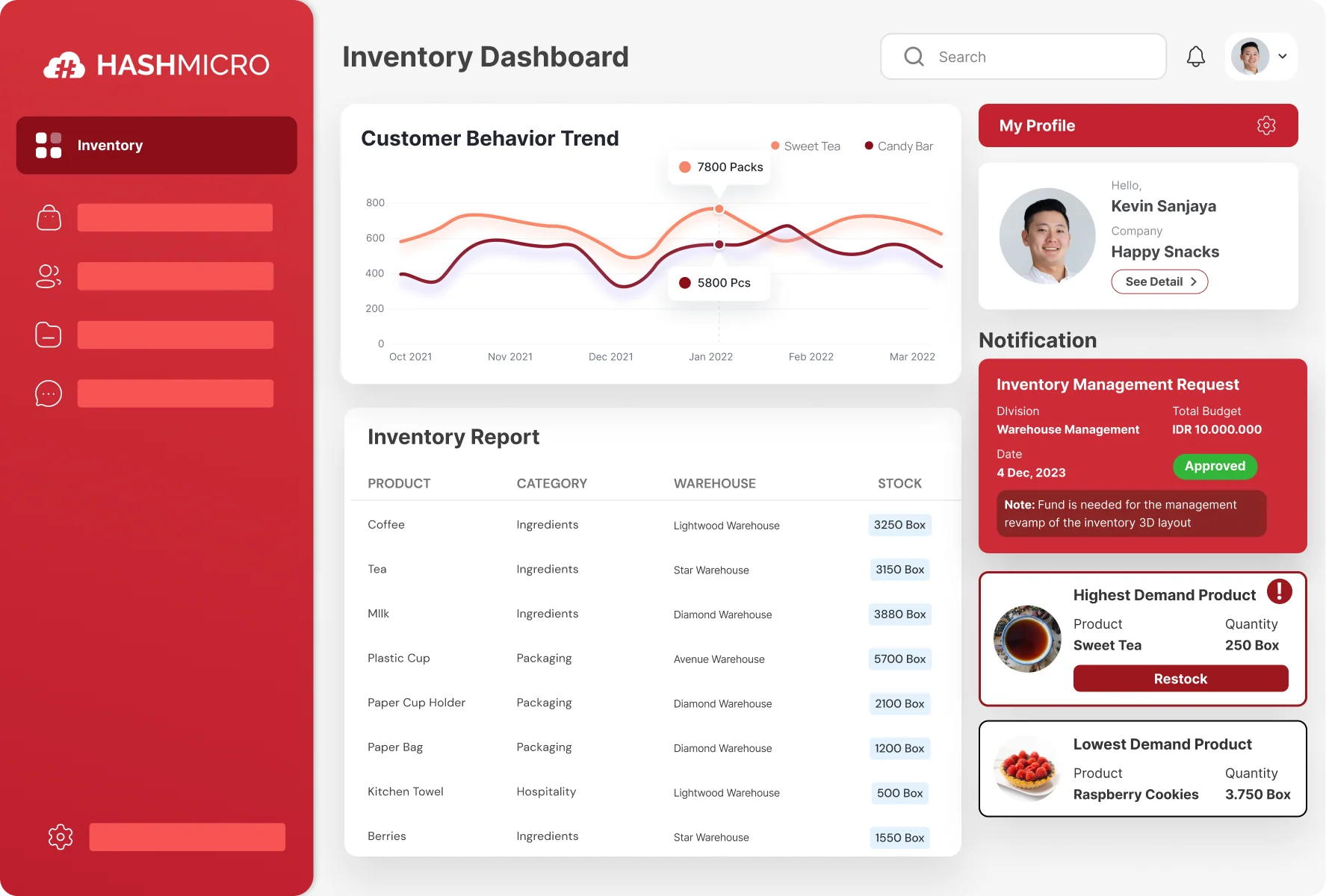Supply chain management has evolved beyond traditional methods, which often struggle with inefficiencies, rising costs, and unpredictable demand. Today, supply chain systems are being increasingly modernized, with many businesses adopting AI to achieve faster and more accurate operations.
AI in supply chain management automates processes, enhances forecasting, and optimizes resources, enabling companies to predict demand more accurately, streamline logistics, and eliminate bottlenecks for improved decision-making. Embracing AI is crucial for businesses to remain competitive and thrive in today’s market.
Nagtataka kung paano maaaring gawing moderno ng AI sa supply chain ang iyong negosyo? Keep reading to discover how AI can drive efficiency and growth in today’s evolving market.
Table of Contents

Key Takeaways
|
What is AI in Supply Chain?
AI in the supply chain applies artificial intelligence to optimize supply chain processes, leveraging machine learning, data analytics, and automation to enhance decision-making, forecasting, inventory management, and logistics.
AI is transforming the way supply chains operate, from predicting demand and automating restocks to identifying and flagging potential delays before they occur. With machine learning and real-time data, companies can respond more quickly, reduce costs, and make more informed decisions across their operations.
How does AI in Supply Chain Work?
AI in the supply chain leverages advanced technologies, including machine learning, data analytics, and automation, to enhance decision-making, optimize operations, and improve efficiency across various supply chain processes. Here’s how it works:
- Data collection and analysis
AI systems collect data from various sources like inventory levels, weather conditions, and sales records. This data is processed using algorithms that clean and organize it, and then machine learning models analyze the data to identify patterns, correlations, and trends to inform predictive insights. - Demand forecasting
AI solutions predict demand by analyzing historical data, market trends, and real-time factors through machine learning algorithms. These algorithms model the data to recognize patterns and generate forecasts, which are then used to adjust inventory levels and production schedules. - Automation of tasks
AI automates routine tasks such as order processing, stock management, and route optimization using robotic process automation (RPA) and AI-driven decision algorithms. These systems follow predefined rules and learn from data to streamline operations, reducing manual input and improving accuracy. - Optimization and efficiency
AI optimizes operations like inventory management and production scheduling by analyzing real-time data and historical performance. Optimization algorithms, such as linear programming or genetic algorithms, process this data to find the most efficient solutions for resource allocation and route planning. - Real-time monitoring and adaptation
AI systems monitor supply chain activities in real time using IoT sensors and tracking devices. When disruptions occur, such as delays or shortages, AI uses predefined rules and real-time data to adjust schedules automatically, reroute shipments, or inform relevant parties, minimizing disruption.
Read more: 10 Best Agriculture Software for Farmers in Philippines 2025
Benefits of AI in Supply Chains
As businesses compete in a complex market, integrating AI into supply chains presents a transformative opportunity. Here are the advantages of supply chain digital transformation that can help companies build more resilient, agile, and customer-focused systems.
- Improved efficiency
AI automates repetitive tasks, such as inventory tracking and order processing, thereby speeding up operations and reducing human error. It enhances workflow efficiency, allowing employees to focus on strategic activities. - Enhanced forecasting
AI analyzes historical data and market trends to predict future demand. By incorporating real-time data, such as weather or economic factors, it dynamically adjusts forecasts, leading to improved planning and helping businesses avoid stockouts or excess inventory. - Cost reduction
AI enhances supply chain operations, such as route planning and stock management, thereby lowering costs. By reducing waste and optimizing resources, companies cut transportation, inventory, and production expenses, boosting profitability and efficiency. - Better decision-making
AI analyzes large datasets to provide insights that inform supply chain decisions. With real-time visibility and predictive analytics, businesses can make informed decisions more quickly, thereby enhancing their supply chain performance. - Increased agility
AI helps supply chains adapt to changes in demand, disruptions, or shortages. By analyzing real-time data, businesses can proactively adjust their processes and strategies, ensuring faster responses to market shifts and greater operational flexibility. - Sustainability
AI-powered tools, such as route optimization, reduce fuel use and emissions. By streamlining transportation and production, AI fosters eco-friendly operations, contributing to sustainability goals and reducing costs. - Enhanced customer experience
AI enhances inventory management and supply chain visibility, enabling faster responses and more accurate deliveries. By optimizing logistics and communication, AI ensures timely order fulfillment, thereby improving customer satisfaction and loyalty.
Challenges of AI in Supply Chain
While the benefits of generative AI in the supply chain are clear, overcoming the associated challenges is essential for successful implementation. Below are the challenges of AI in the supply chain that businesses must address to unlock its full potential.
- Data quality and integration
AI relies heavily on accurate, high-quality data. Poor data quality or the inability to integrate data from various sources can lead to incorrect predictions and decisions. Ensuring data consistency across systems is crucial for AI to deliver reliable results. - High implementation costs
Adopting AI in supply chains can be costly, particularly for small to medium-sized businesses. The expenses associated with AI software, infrastructure upgrades, and training staff can be a significant barrier to entry, especially for companies with limited budgets. - Complexity and expertise
AI technologies need specialized knowledge for effective implementation and management. Many businesses struggle to find skilled professionals who understand both AI and supply chain operations, which delays adoption and reduces effectiveness. - Resistance to change
Employees and stakeholders may resist AI solutions due to concerns about job loss or process disruptions. Overcoming this requires effective change management strategies, including training and demonstrating the benefits of AI. - Cybersecurity risks
AI systems managing sensitive supply chain data raise cyberattack risks. Businesses must invest in robust cybersecurity to protect AI from data breaches and threats that could compromise supply chain integrity. - Scalability
Scaling AI in complex global supply chains is a significant challenge. As these supply chains expand, ensuring that AI systems manage large data volumes and adapt to new requirements becomes increasingly tricky. - Ethical and legal concerns
The role of AI in supply chains raises significant ethical and legal concerns regarding data privacy, transparency, and accountability. Companies must ensure that their AI solutions comply with relevant regulations and ethical standards to avoid potential legal issues.
AI in Supply Chain Management for Different Industries
Across these industries, AI is helping businesses drive greater efficiency, sustainability, and customer satisfaction, while also enabling them to navigate challenges and optimize supply chain operations. Here’s how AI is transforming supply chains across different sectors:
- Retail
AI optimizes inventory, enhances forecasting, and personalizes marketing in the retail industry. It helps retailers predict customer preferences, streamline inventory management, and ensure timely product availability, thereby improving customer satisfaction and profitability. - Manufacturing
AI in manufacturing optimizes production schedules, minimizes downtime, and enhances quality control. By analyzing real-time data, it predicts maintenance needs, automates assembly lines, and reduces costs. - Healthcare
In healthcare supply chains, generative AI enhances inventory management, improves demand forecasting, and optimizes distribution. It ensures the timely delivery of medical equipment, supporting better patient care. - Automotive
AI streamlines parts sourcing, logistics, and delivery in the automotive industry. It analyzes supply chain data to reduce lead times and enhance inventory control, ensuring efficient production and effective management of suppliers. - Agriculture
AI in agriculture optimizes the supply chain, aiding in demand forecasting, inventory management, and transportation to ensure that fresh products reach the market efficiently. AI sensors track crop health and enhance yield predictions. - Pharmaceuticals
In the pharmaceutical industry, AI enhances demand forecasting for drugs and medical supplies, optimizing distribution to ensure compliance and maintain the integrity of sensitive products, such as vaccines and biologics, throughout the supply chain. - Logistics and transportation
AI optimizes logistics by enhancing route planning, managing fleets, and predicting maintenance. Analyzing traffic, fuel prices, and weather enables AI to reduce costs, improve delivery times, and enhance fleet efficiency.
Practical AI Applications in Supply Chain
The practical applications of generative AI in supply chain management are revolutionizing the way businesses operate, enhancing efficiency, accuracy, and customer satisfaction. Here are some key areas where AI is being applied effectively.
1. Demand forecasting
AI-powered predictive analytics tools analyze historical sales data, market trends, and real-time conditions to forecast demand with greater accuracy. It helps businesses ensure they maintain optimal inventory levels, reduce stockouts, and avoid overstocking.
2. Inventory optimization
AI systems utilize machine learning to monitor inventory in real-time and adjust orders based on demand forecasts, thereby reducing excess stock, preventing shortages, and enhancing cash flow and storage efficiency.
3. Route optimization
AI applications in logistics optimize delivery routes by considering variables such as traffic, weather, and fuel prices. It reduces delivery times, cuts transportation costs, and lowers carbon emissions, making supply chains more efficient and sustainable.
4. Predictive maintenance
In manufacturing and logistics, AI-driven predictive maintenance tools analyze data from machinery and equipment to predict failures before they occur. It reduces unplanned downtime, extends equipment lifespan, and lowers maintenance costs.
5. Supply chain visibility
AI solutions offer end-to-end supply chain visibility by consolidating data for real-time tracking of shipments, inventory, and production, enabling businesses to respond quickly to disruptions.
6. Supplier management
AI helps companies assess supplier performance by analyzing historical data, delivery times, and quality of goods. It can also identify potential risks, enabling businesses to proactively manage supplier relationships and maintain a more reliable supply chain.
7. Automation of routine tasks
AI workflow automation utilizes robots and chatbots to automate routine tasks, including order processing, data entry, and customer service. This reduces human error, speeds up workflows, and enables employees to focus on more strategic tasks.
8. Fraud detection
Additionally, AI algorithms can detect fraudulent activities by analyzing transactional data for unusual patterns or inconsistencies. It helps businesses identify potential fraud and prevent financial losses, ensuring the integrity of their supply chain operations.
9. Personalized customer experience
AI enables companies to offer personalized services, such as customized recommendations and tailored delivery options, based on customer behavior and preferences. It enhances customer satisfaction and fosters brand loyalty.
How AI in Supply Chain Management Can Enhance Sustainability
AI in supply chain management can significantly enhance sustainability by optimizing operations to reduce waste, lower emissions, and improve resource efficiency. Here’s how AI contributes to sustainability.
- Route optimization
Inefficient delivery routes lead to higher fuel consumption and increased carbon emissions. To solve this problem, AI optimizes delivery routes by considering factors such as traffic, weather, and fuel prices, thereby reducing fuel consumption and carbon emissions to make them more efficient and eco-friendly. - Energy efficiency
Inefficient energy usage throughout the supply chain results in higher energy costs and a larger environmental footprint. AI solves this problem by identifying opportunities to reduce consumption in production, storage, and transportation. This results in lower energy costs and a smaller environmental footprint. - Waste reduction
In the supply chain, factories and manufacturers often overproduce their goods and products. To solve the problem, AI forecasts demands from the markets, so that they can minimize waste from both the finished products and the excess energy used to produce goods. - Sustainable sourcing
Difficulty in identifying and evaluating suppliers who meet sustainability criteria is one of the problems in supply chains. Generative AI in the supply chain enables businesses to identify and assess partners that support sustainability, allowing companies to collaborate with eco-friendly partners. - Circular economy
Inefficient recycling leads to waste and underutilization of materials. To solve this problem, AI optimises recycling, tracks material lifecycles, and identifies reuse opportunities to reduce waste and conserve resources.
Understanding the cost implications is crucial to exploring how AI can further enhance sustainability in your supply chain. Download our pricing scheme to discover how AI-driven solutions can improve your supply chain’s sustainability while staying within budget.

The Utility of AI in Supply Chain Planning
AI’s role in supply chain planning is pivotal in streamlining processes, optimizing resources, and improving decision-making. Implementing AI in these planning stages allows companies to stay ahead of market changes and build more resilient, cost-effective supply chains.
- Demand forecasting
AI analyzes historical sales data, market trends, and external factors (such as weather and economic conditions) to predict future demand. It enables businesses to plan production schedules, inventory levels, and procurement strategies more accurately. - Inventory optimization
AI helps optimize inventory by balancing supply and demand. It ensures that businesses maintain adequate stock levels while avoiding overstocking or stockouts, leading to reduced storage costs and improved cash flow. - Production scheduling
AI enhances production planning by considering factors such as machine capacity, labor availability, and supply chain constraints. It ensures that resources are allocated efficiently, reducing delays and maximizing throughput. - Supplier and partner management
AI aids in evaluating supplier performance by analyzing key factors such as delivery reliability and product quality. It helps businesses identify the most suitable suppliers, negotiate more favorable terms, and enhance overall supply chain reliability. - Scenario planning
AI enables businesses to simulate different supply chain scenarios, such as demand spikes or disruptions, to assess potential risks and develop contingency plans. It helps organizations respond more effectively to unexpected changes in the market or supply chain.
Steps to Prepare a Supply Chain for AI
Successfully preparing your supply chain for AI integration requires careful planning and execution. Following these steps ensures a smooth transition and maximizes the potential of AI to transform supply chain operations.
- Assess current processes
Firstly, evaluate existing supply chain operations to identify inefficiencies, bottlenecks, and areas that would benefit from AI. It helps in understanding where AI can have the most significant impact. - Invest in data infrastructure.
Secondly, AI relies on high-quality data. Ensure that your supply chain systems are capable of collecting, storing, and analyzing data from various sources to provide accurate inputs for AI systems. - Choose the right AI tools.
Thirdly, select AI solutions tailored to your business needs, such as predictive analytics, demand forecasting, or route optimization, to drive efficiency and growth. Ensure the chosen tools integrate well with your existing systems. - Train employees and build expertise.
Equip your team with the necessary skills to work with AI systems. For instance, companies should provide training on data management, AI tool usage, and decision-making processes enhanced by AI. - Pilot AI solutions
Start with a small-scale pilot project to test AI tools in a specific area of the supply chain. Measure the results, gather feedback, and refine the system before implementing it on a full scale. - Monitor and optimize
Lastly, once AI is implemented, continuously monitor its performance and make adjustments as needed. Utilize insights from AI analytics to optimize processes and enhance decision-making over time.
Leverage Your Supply Chain Management with HashMicro AI Supply Chain Software
Established in 2015, HashMicro AI Supply Chain Software has become a prominent provider of AI-powered supply chain solutions in the Philippines. Serving over 2,000 clients across Southeast Asia, HashMicro offers intuitive and comprehensive SCM solutions.
HashMicro AI Supply Chain Software provides significant advantages for those interested in exploring its features, including a free demo, business consultations, and unlimited user access with no special requirements.
Dedicated to optimizing complex and sustainable supply chain processes, HashMicro AI Supply Chain Software delivers advanced features fueled by cutting-edge artificial intelligence. Below are some of its key features.
- AI-powered restock recommendations: Automatically receive alerts when inventory levels fall below the set threshold, along with intelligent suggestions for restocking the right products.
- Automated planning & forecasting: Use historical data to automatically generate production, procurement, and inventory plans that align with future customer demand.
- Real-time stock updates via AI chat: Access up-to-date warehouse inventory instantly through the integrated AI chat feature for precise and informed decision-making.
- Shipment tracking: Track courier locations in real-time to ensure timely and accurate deliveries to customers, enhancing the delivery experience.
- Return management: Streamline the product return process by offering seamless tracking and real-time updates on stock levels, ensuring efficient handling of customer returns.
Conclusion
To conclude, supply chains face challenges like inefficiencies, fluctuating demand, and rising costs. AI automates processes, enhances forecasting, and optimizes resource allocation, improving efficiency and decision-making.
HashMicro AI Supply Chain Software provides a comprehensive tool to streamline and optimize your supply chain operations. With AI-driven features, it evidently supports better forecasting, real-time decision-making, and sustainable practices, empowering businesses to stay ahead of the competition.
Experience the benefits of HashMicro AI Supply Chain Software through our free demo. Discover firsthand how our solution can transform your supply chain management and drive efficiency for your business. Palaguin ang iyong negosyo sa amin ngayon!

Frequently Asked Questions About AI in Supply Chain
-
What does the future hold for AI in supply chain management?
Global supply chains face challenges from climate change, geopolitical tensions, and industrial disruptions. By 2025, AI technologies are expected to optimize supply chains. Enhanced visibility, like GRSI, offers key opportunities for innovation.
-
How can AI contribute to sustainability in supply chains?
AI reduces supply chain carbon footprints by optimizing delivery routes using real-time data on traffic, weather, and fuel prices. It minimizes fuel consumption and emissions, while providing cost savings for businesses and promoting sustainable practices.
-
How does AI improve demand forecasting in supply chains?
AI enhances demand forecasting by integrating with supply chain systems, considering lead times, transportation constraints, and supplier reliability. This synchronization reduces inefficiencies and aligns operations with demand patterns, thereby optimizing resource utilization.




















